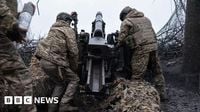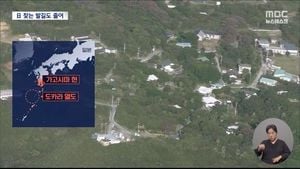Ukraine is accelerating efforts to jointly produce weapons with international allies as it faces a critical juncture in its defense amid the United States' recent decision to halt some arms shipments. This move by Washington, announced in early July 2025, has sparked concern in Kyiv and among European partners, highlighting the complex dynamics of military support in the protracted conflict with Russia.
The war, launched by Moscow nearly three and a half years ago, continues to strain Ukraine's defenses severely. According to Ukraine’s Foreign Ministry, any delay or hesitation in supporting the country's defense capabilities would only embolden the aggressor to prolong the conflict rather than seek peace. This warning came on July 2, 2025, underscoring the urgency felt by Kyiv as Russian missile and drone attacks relentlessly batter Ukrainian cities.
Despite the tension, Ukraine's Defense Ministry stated it had not received any official notification from the United States regarding the suspension or revision of arms delivery schedules. Officials have requested direct communication with their U.S. counterparts to clarify the status of specific weapons shipments. Ukrainian President Volodymyr Zelenskyy confirmed that Kyiv and Washington were "now clarifying all the details regarding the supply of defense support, including air defense components," emphasizing the necessity of protecting Ukrainian people amid ongoing hostilities.
On July 1, 2025, the White House announced it had cut off some weapons deliveries to Ukraine, citing a strategic review of U.S. military support and assistance worldwide. White House Deputy Press Secretary Anna Kelly explained the decision was made "to put America’s interests first following a review of our nation’s military support and assistance to other countries across the globe." The Pentagon’s move, reportedly signed off by Defense Secretary Pete Hegseth, reflects concerns that U.S. weapons stockpiles, including air defense missiles, precision-guided artillery, and other critical munitions, have fallen too low.
The specific weapons affected by the halt include shipments of Patriot missiles, precision-guided GMLRS rockets, Hellfire missiles, and Howitzer rounds. These systems are among the most formidable in Ukraine's battlefield arsenal and crucial for defending against Russia’s increasingly intense aerial assaults. Over the weekend preceding the announcement, Ukraine endured its largest aerial attack since the full-scale invasion began, with more than 500 drones and ballistic and cruise missiles launched at Ukrainian cities.
Ukraine’s Foreign Ministry summoned the U.S. chargé d’affaires in Kyiv, John Hinkel, to discuss ongoing defense cooperation, emphasizing the "critical importance" of maintaining previously allocated defense packages, particularly for bolstering air defense. Meanwhile, Kremlin spokesman Dmitry Peskov welcomed the Pentagon’s decision, stating, "The fewer weapons supplied to Ukraine, the closer the end of the special military operation is," reflecting Moscow’s perspective on the conflict’s trajectory.
European countries have increasingly stepped up military aid to Ukraine, surpassing the U.S. for the first time since June 2022. According to Germany’s Kiel Institute, European nations provided 72 billion euros (approximately $85 billion) in military aid by June 2025, compared to 65 billion euros ($77 billion) from the United States. Danish Defense Minister Troels Lund Poulsen highlighted this shift, urging Europe to invest more in Ukraine’s defense industry, especially in light of the U.S. decision to pause some shipments. Denmark, which assumed the EU’s rotating presidency on July 1, 2025, is already investing directly in Ukraine’s defense production capabilities and facilitating Ukrainian companies to manufacture military equipment on safer European soil, with operations expected to begin as soon as September.
Ukrainian Defense Minister Rustem Umerov announced plans to introduce draft legislation in the Ukrainian parliament later in July 2025 to enable joint weapons production with allies. This legislation aims to create a special legal and tax framework to help Ukrainian defense manufacturers scale up and modernize production, including building new facilities domestically and abroad. Earlier in the week, German Foreign Minister Johann Wadephul visited Kyiv with representatives from the German defense industry, signaling Germany’s commitment to help Ukraine produce more weapons more rapidly.
Despite these efforts, analysts caution that European allies cannot fully compensate for the loss of U.S.-made systems such as HIMARS and Patriot air defense missiles, which are vital for Ukraine’s defense against Russian ballistic missile attacks. The sophisticated Patriot system alone costs over $1 billion, with individual interceptor missiles priced at nearly $4 million each. U.S. officials have noted that "we use munitions faster than we can make them," underscoring the logistical challenges in replenishing stockpiles amid global military commitments.
The decision to halt some arms shipments has stirred political debate in the United States. Democratic lawmakers criticized the move, arguing that cutting off promised support to Ukraine harms U.S. national security and benefits Russian President Vladimir Putin. Representative Adam Smith, ranking Democrat on the House Armed Services Committee, stated, "Cutting off promised support to Ukraine harms U.S. national security and only benefits Vladimir Putin." Meanwhile, the Pentagon maintains that it continues to provide the President with robust options to support Ukraine while preserving U.S. forces’ readiness for other defense priorities.
Relations between Kyiv and Washington have been complex, especially under the Trump administration. President Donald Trump, who met with Zelenskyy at the NATO summit in late June 2025, indicated willingness to supply Patriot missiles, describing them as "very hard to get" but essential for Ukraine’s defense. However, earlier in 2025, Trump had paused military aid earmarked by the previous Biden administration, though those pauses were later lifted. The U.S.-Ukraine agreement signed in April 2025, granting the U.S. access to Ukraine’s mineral reserves in exchange for military assistance, further illustrates the intertwined strategic interests.
Meanwhile, diplomatic efforts continue amid the conflict. On July 1, French President Emmanuel Macron and Russian President Vladimir Putin held their first direct telephone call in nearly three years. Macron reiterated France’s "unwavering support for Ukraine’s sovereignty and territorial integrity" and called for a ceasefire and negotiations toward a "solid and lasting settlement of the conflict." The Kremlin, however, maintained that Western policies had ignored Russia’s security concerns for years, contributing to the war.
On the battlefield, Russia claims to have secured full control over the eastern Luhansk region and parts of the southeastern Dnipropetrovsk area, though Ukrainian authorities dispute some of these claims. Moscow currently controls about 20% of Ukrainian territory, including the Crimea peninsula annexed in 2014. Ukrainian forces continue to resist, recently conducting an attack that killed three people at a Russian arms production factory in Izhevsk, located over 1,000 kilometers from the Ukrainian border.
As the war enters its fourth year, Ukraine’s push to develop its own defense manufacturing capabilities and deepen cooperation with international allies reflects a strategic pivot in response to shifting global support dynamics. While the U.S. reassesses its military aid in light of stockpile concerns, European nations are stepping up, and Kyiv is determined to maintain its defense capabilities to withstand ongoing Russian aggression.




